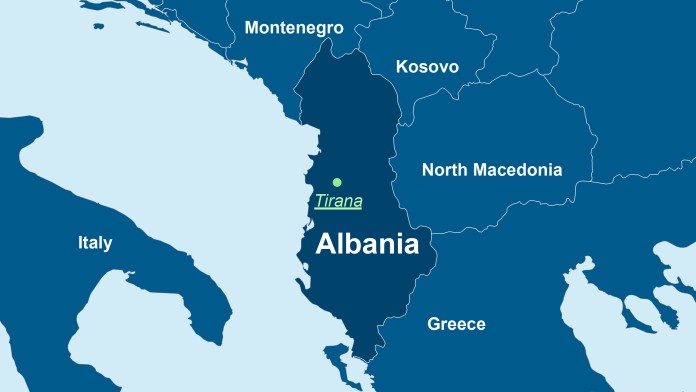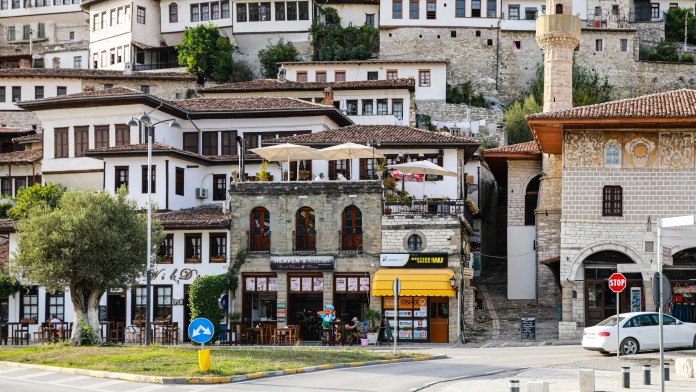
As of: 01/2024
Even in larger cities in Albania, the supply of drinking water is still unreliable. Dilapidated infrastructure leads to a great deal of unaccounted for water. Not all households have been connected to a regulated sanitation system yet. The Water Sector Performance and Investment Programme (WPIP) aims to help improve the water supply and sanitation in six medium-sized cities in the country. On behalf of the German Federal Government, KfW is working with other donors to promote the WPIP. In the medium term, investments in the water sector will help Albania to align with EU standards in this regard.
Although Albania has sufficient water resources, many households still lack an adequate and reliable supply of drinking water. Waste water disposal is also often unregulated. Water supply and disposal systems are often only rudimentary or outdated. Sometimes drinking water is only supplied for a few hours a day due to dilapidated pipe systems and unaccounted for water loss. Similarly, it is often the case that water meters have not been installed so the suppliers do not know the flow rates within the supply network and households do not know how much they have consumed.
Before the 2022 sector reform, water supply and sanitation were solely in the hands of the local authorities, which did not have sufficient budgets to operate these sustainably and reliably; this often led to backlogs in repair and renovation work. For their part, the water suppliers are unable to start modernisation work when the tariffs are low and do not cover costs. They are also suffering from a lack of skilled staff.
Due to the complete absence of or inadequate sanitation and waste water treatment, some untreated waste water is discharged into rivers and the sea, leading to significant environmental pollution.
All this not only endangers the health of local residents and the environment, but also the development of tourism and the region's economy.

KfW, acting on behalf of the Federal Ministry for Economic Cooperation and Development, is working with the EU and Switzerland to promote the WPIP programme in Albania. KfW has contributed EUR 89 million during this phase of the project alone. Joint financing helps to create leverage because larger projects can be implemented.
First of all, a feasibility study identified the need for drinking water treatment plants, tanks for storing drinking water and distribution, including the installation of water meters in households. The need for investment in the sewerage network, waste water treatment and flood protection was also collated to ensure the safe disposal of the waste water produced.
In six cities, new pumps and water pipes are now being built or existing ones upgraded. New water meters will also be installed.
In addition, sanitation is also being expanded. Many households that had previously only had septic tanks are being connected to the sewerage system. A new sewage treatment plant is also being constructed in Berat.
The aim is to contribute to social and economic development as well as the development of tourism in the region by expanding the water supply. Environmental protection is to be improved. The programme helps to secure a reliable and hygienic water supply for the population. The tariffs for drinking water should be socially affordable and cover the water suppliers' costs.
The programme employs a performance-based approach, which means that the partner and the water suppliers must first achieve the performance targets before they receive the disbursements. This will reward the water suppliers’ own efforts. KfW has agreed a clear and ambitious but achievable programme with the individual municipal water suppliers and this is being implemented gradually.
The project is being implemented in these six medium-sized cities:
The secure supply of clean drinking water to the population in the six cities has improved, while tariffs remain socially affordable. Over 200,000 people are benefiting from this. The supply of clean, hygienic water and regulated sanitation for around 42,000 people have helped to improve the health of local residents. The ground water and bodies of water in the region are better protected against the pollution caused by the expansion of the sanitation system.
The management and performance of the water utility companies in the six selected cities have improved.
The improved infrastructure in the communities contributes to social and economic development. In the tourist regions, important prerequisites for tourism have been created. In addition, the country is approaching EU standards in this sector.
The project contributes to the achievement of these following United Nations Sustainable Development Goals:
KfW Group
KfW Development Bank
Urban infrastructure in Southeast Europe and Turkey
Share page
To share the content of this page with your network, click on one of the icons below.
Note on data protection: When you share content, your personal data is transferred to the selected network.
Data protection
Alternatively, you can also copy the short link: https://www.kfw-entwicklungsbank.de/s/enzByoIO
Copy link Link copied